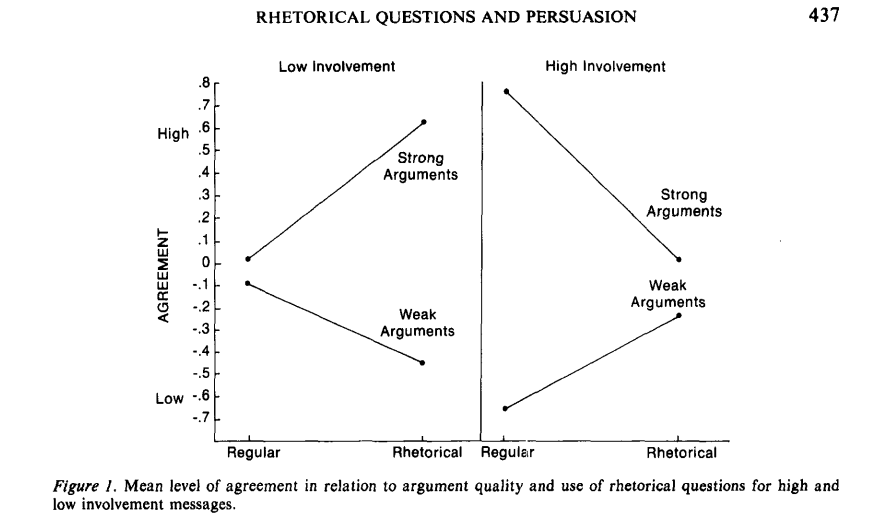In this clip from the
movie It’s a Wonderful Life, George Bailey is suddenly motivated to convince
the loan board (his audience) that his father’s business was of use, and was
better than Mr. Potter’s exploitative company. He does this in many ways, one
of the most salient being the use of rhetorical questions.
- “Doesn’t it make them better men?"
- "Doesn’t it make them better customers"
- "Wait? Wait for what?! Until their children grow up and leave them? Until they’re so old and broken down…"
- “Well is it too much to have them work and pay and live and die in a couple of decent rooms and a bath? Anyway my father didn’t think so…”
- “Doesn’t it make them better men?"
- "Doesn’t it make them better customers"
- "Wait? Wait for what?! Until their children grow up and leave them? Until they’re so old and broken down…"
- “Well is it too much to have them work and pay and live and die in a couple of decent rooms and a bath? Anyway my father didn’t think so…”
He is speaking to a
previously inattentive audience, as they were invested in Mr. Potter’s business
plans. It’s of low personal relevance to them, as it is simply a part of their
jobs to decide who gets loans. Furthermore, George Bailey has strong arguments;
his father’s company was better as it allowed people to live away from the
slums created by Mr. Potter. These three aspects of the speech combine to make
the use of rhetorical questions effective. This was investigated in a study by
Petty, Cacioppo and Heesacker (1981), who looked into the effects of rhetorical
questions on persuasion.
The study by Petty,
Cacioppo and Heesacker (1981) used 160 undergraduate participants, in a 2x2x2
factorial design, which investigated high or low issue involvement, strong or
weak argument quality, and regular or rhetorical form. Participants heard one
of 4 communications, stating that seniors should have to pass an extra exam
before graduation. Before this they read a passage about the background of the
broadcaster. For subjects in the high involvement conditions, the paragraph
explained the reasons for the test advocacy in their university, and how it
personally affected each of the students. In the low involvement one, it stated
that a president of a distant university had said the change would be good in
his own university. They manipulated argument quality by either giving the
students a high quality, well thought out argument, or one which was weak. The
message either included rhetorical questions or not.
There were two
measures of the participant’s responses, the first on attitude and the second
cognitive response. They measured attitude on a rating scale, with participants
indicating if they found the broadcast good-bad, beneficial-harmful,
wise-foolish, and favorable- unfavorable. Next, they responded the extent to
which they agreed with the extra exam proposal. To investigate cognitive
responses, participants had 2 minutes to list some of their thoughts during the
communication. Two blind judges scored the responses.
As the table above demonstrates, it was found that participants hearing the strong argument were more in
agreement with the exam proposal than those in the weak condition. Students
generated more counterarguments when the suggestion came from the president of
their school, so it personally affected them. There was a three way interaction;
when rhetorical questions were used, the argument was strong, and impersonal it
increased persuasiveness.
Thus, George Bailey's speech can be seen as maximally effective in terms of its persuasive strength. He's using rhetorical questions, and a strong argument (because his fathers company kept people out of the slums), to an audience who have no personal ties, thus, low involvement. They have no personal ties to this because it is simply their job to give loans to businesses, it will not impact their personal lives whether it goes to one or another. George Bailey's speech should convince them to support his cause.
Thus, George Bailey's speech can be seen as maximally effective in terms of its persuasive strength. He's using rhetorical questions, and a strong argument (because his fathers company kept people out of the slums), to an audience who have no personal ties, thus, low involvement. They have no personal ties to this because it is simply their job to give loans to businesses, it will not impact their personal lives whether it goes to one or another. George Bailey's speech should convince them to support his cause.
Petty, R. E., Cacioppo,
J. T., & Heesacker, M. (1981). Effects of rhetorical questions on
persuasion: A cognitive response analysis. Journal of Personality and Social
Psychology, 40(3), 432-440


No comments:
Post a Comment
Note: Only a member of this blog may post a comment.